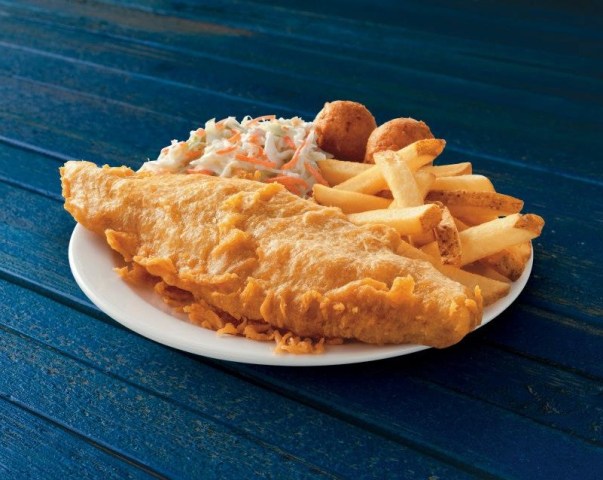Heart Attack on a Hook: The Unhealthiest Restaurant Meal in America
"Long John Silver's Big Catch meal deserves to be buried 20,000 leagues under the sea."

The Center for Science in the Public Interest has determined through lab tests that Long John Silver’s “Big Catch” meal is the “Worst Restaurant Meal in America.” The meal of fried fish, hushpuppies, and onion rings has 33 grams of trans fat, 19 grams of saturated fat, 3,700 milligrams of sodium, and 1,320 calories, going above and beyond the baseline of unhealthy restaurant food. Apparently, the pirate-themed seafood chain decided that sensible limits on unhealthy ingredients were more like guidelines than actual rules.
The Big Catch is a limited-time offering that has been accompanied by a promotional campaign that challenges customers to finish the meal and post a photo of it on Long John Silver’s Facebook page. Because Long John Silver’s apparently decided that people aren’t posting embarrassing enough things for the whole world to see on the Internet.
While other restaurants have exceeded Long John Silver’s in calories per meal, the Big Catch makes up for it in other areas. The CSPI found the absurdly-high amount of trans fat most troubling; the non-profit sued KFC in 2006 for using partially-hydrogenated oil like the Big Catch uses, and even then KFC’s worst meal only had 15 grams of trans fats, less than half as much. To put that into perspective, the American Heart Association advises limiting intake of trans fat to two grams per day; in one meal you’d be having enough for 16 days.
Furthermore, the CSPI charged that the meal was riddled with false advertising. Ads boasted that the Big Catch’s haddock was “3X bigger,” which a fine-print footnote clarified to “Compared to 1 piece uncooked Alaskan pollock,” not exactly a standardized unit of measure. The promised “7-8 ounces of 100 percent premium Haddock caught in the icy waters of the North Atlantic” turned out to be 4.5 ounces of fish and nearly three ounces of oil-fried batter. The CSPI’s tests also found that the onion rings had over twice as much trans fat as the restaurant reported, and “also found the chain understated saturated fat and sodium in the Hushpuppies and Onion Rings.”
Long John Silver’s responded to the CSPI announcement on its website and on Twitter, saying, “We stand behind our published food data and will review any requests from CSPI that raise questions about our data.” The chain’s official Twitter account also defended their position and didn’t quite deny the specific allegations from the CSPI.
@deannadugo @ma_butler @CSPI If we may jump in, we never lied about any ingredients or claimed anything it wasn’t. http://t.co/5pEZ5UlT5G
— Long John Silver’s (@longjohnslvrs) July 3, 2013
The CSPI has threatened a lawsuit if the restaurant chain continues to use partially-hydrogenated soybean oil and does not accurately report factual nutritional information. It also sent a letter to the FDA, urging the federal government to get partially-hydrogenated soybean oil “out of the American food supply promptly and permanently.”
(Center For Science In The Public Interest, image via Facebook)
- Japanese McDonald’s offers the Mega Potato, 3/4ths of a pound of French Fries
- Big surprise: Study funded by candy lobbyists finds no link between candy and obesity
- Two deep-fried birds with one stone: congealed cooking oil in London sewers used to make electricity
Have a tip we should know? tips@themarysue.com